|
View: 86151|Reply: 109
|
Information about breastfeeding
[Copy link]
|
|
|
Assalamualaikum / hi...
I am going to open a topik about info on breastfeeding
Untuk ditempek segala artikel berkaitan breastfeeding for moms-to-be, new moms and lactating moms to refer to.
Topik ini semata untuk informasi. Segala soalan berkaitan breastfeeding boleh diajukan ke thread berkaitan.
TQVM. |
Rate
-
1
View Rating Log
-
|
|
|
|
|
|
|
|
|
|
|
PETUA MEMBANYAKKAN SUSU BADAN:
pemakanan:
lobak putih
ikan semua jenis ikan ikan yu (tak penah mkn lg) ikan sardine, tuna, salmon
kurma
jantung pisang
kucai +tauhu+tougeh
petola
kentang rebus
longan kering (air mata kucing)
roti
biskut marrie
daun turi
susu/ soya
halba (msk dlm nasi & air rebusannya minum)
pengaga
kacang buncis
sayur sawi
cheese
planta
Minuman:
air masak
susu
soya
nestum
oat
horlick
milo
jus buahan
buahan betik/honeydwe
rebusan buah pala
spirulina
air kelapa
rebusan air halba
suuplement yg perlu ambik:
omega 3
obimim
kalsium
vitamin c
Utk urutan plak:
1) sikat puting setiap hari, baca selawat pastu sikat dari atas keputing....kanan dan juga kiri
2) cuci dengan berus gigi puting2 tuuu takut tersumbat liang2 puting susu
3) kalau sblm mengepam tuuuu, ambik kedua belah tangan urut dari atas terus lurutkan kebawah...(bc selawat dulu)...insyaallah itu salah satu urutan utk BF
Masa pengepaman:
1)cuba pam sekerap mungkin, lagi byk kita pam...lagi byk pengeluaran susu cthnya 3jam sekali
2)mlm bagi baby isap kerap ....sebab bila mlm kalou kita bg baby isap boleh membaykkan pengeluaran susu juga
3) bila pam, pam sampai susu tak keluar.....nanti tetek kita akan produce susu baru....istilah yg kita selalu guna mcm kita'buang sampah...sampah dah penuh, kita buang dlm tong sampah...pastu kita ganti dgn plastik sampah baru' gitu jugak mcm air susu kita...bila kita dah habis pam, die akan mengeluarkan susu baru
4) sblm pam minum air suam dulu....lepas pam pon minum jugak.
5) jgn minum air sejuk/ais nanti susu cepat kering
jgn minum teh/nescafe taou.....mkn supplement jgn tinggal
Ubat
Ubat untuk tambah hormone prolactin (* recommended)
1) Domperidone*
2) Maxolon
3) Metoclopramide (boleh jadi depression)
4) Motilium
5) Raglan (boleh jadi depression)
Cara-cara Lain
1) baca surah al baqarah ayat 60. sambil baca letakkan tangan pada breast tu. (satu lagi surah surah al-Hujurat kalau tak salah)
2) Sapukan sedikit minyak kelapa pada daun sirih. Kemudian layurkan pada api sehingga layu. Setelah suam, tekapkan pada buah dada. Lakukan setiap hari.
3) tuam tuala suam ke atas payudara
4) urut belakang
5) urut kat payudara
6) urut tetek pakai sikat?mcm sikat rambut
7) sentiasa berfikiran positif
8) invest pada pam susu yg berkualiti
9) Kerap menyusu bayi
10) kurangkan stress, jangan fikirkan perkara yang menyusahkan hati
11) doa
12) tawakkal |
|
|
|
|
|
|
|
|
|
|
|
RELACTATION
For those yang nak breastfeed baby semula setelah beberapa hari/minggu/bulan berhenti breastfeed baby, petua daripada 'LC' Arianna_Muchtar:
-bf is natural but it is a learned skills yang perlu diprektis oleh both mommy & baby
-kena nekad utk bf walaupun baby nangis
-dia menangis sebab dia lapar sangat
-dan malas nak isap breast *susah dah lambat
-elakkan dia terlalu lapar
-offer breast pada dia selang 30 mins
-walaupun dia tengah tidur
-dengan cara buh nipple tepi mulut dia
-jadi dengan cara tu, dia tak lapar sangat dan boleh bertolak ansur utk bf
note:
memang ada org jenis susu banyak, tp takde yang jenis susu kurang.
sebab susu bergantung pada supply & demand, dan juga pemakanan ibu
make sure makan makanan berkhasiat
nasihat anna:
-beri baby direct feeding, kalau dia menangis, pujuk
-beri dia minum sebelum lapar sesangat
-jangan sesekali gantikan meal dia dengan susu formula
-schedule mengepam masa pantang ialah : 15 minit utk sebelah breast (2 belah = 30 minit) SELEPAS baby minum
-teruskan mengepam walaupun outputnya sedikit (mengikut schedule yang anna tulis di atas)
good luck |
|
|
|
|
|
|
|
|
|
|
|
STORAGE GUIDELINES FOR HUMAN MILK
These guidelines are for mothers who are expressing milk for a full-term healthy baby. Use clean containers, and wash your hands with soap and water before expressing. or pumping. When providing milk for a baby who is seriously ill and/or hospitalized, check with healthcare providers for instructions.
Where storedStorage temperature
(degrees Fahrenheit)Storage temperature
(degrees Centigrade)How longAt room temperature60 degrees F15 degrees C24 hoursAt room temperature66-72 degrees F19-22 degrees C10 hoursAt room temperature79 degrees F25 degrees C4-6 hoursIn a refrigerator32-39 degrees F0-4 degrees C8 daysIn a freezer compartment inside a refrigerator 2 weeksIn a self-contained freezer unit of a refrigerator 3-4 monthsIn a separate deep freeze with a constant temperature0 degrees F-19 degrees C6 months or longer
SAVE? OR DUMP?
Type of MilkSave or Dump?WhyMilk remaining in the bottle that has been offered to babyUse for next feeding, otherwise discard. Bacteria from the baby's mouth may have entered the milk during the feeding. This may lead to bacterial contamination if it sets too long (though as yet there is no research available).Milk that has been thawedSave in the refrigerator for 24 hours after thawing, then discard. Do not refreeze.Milk that has been frozen has lost some of the immune properties that inhibit bacterial growth in fresh refrigerated milk.Milk that has been kept in the refrigerator for eight daysTransfer to storage in the freezer, or discard.Bacterial growth is not a problem, but milk sometimes picks up odors or flavors from the refrigerator or the container. |
|
|
|
|
|
|
|
|
|
|
|
Weaning from formula supplementsPut baby to breast oftenAim for 10 breastfeeding sessons per day. If baby is not breastfeeding well, work with your lactation consultant.
Method for weaning from supplementsDo not drop supplements suddenly |
|
|
|
|
|
|
|
|
|
|
|
I'm not pumping enough milk. What can I do?By Kelly Bonyata, BS, IBCLC
IntroductionMilk supply normally varies somewhat throughout the day and over weeks and months. As long as baby is allowed to nurse on cue, your milk supply will accomodate baby's needs. However, when mom is pumping part-time or full-time, pumping output can become an issue due to a few factors: - The ability to measure how much milk you are pumping makes any decrease in pumping output more obvious and more worrying, even if it's a normal variation.
- Pumping moms generally need to pump x amount of milk for baby for a particular day, and it can be quite stressful when mom does not pump this amount.
- No pump can remove milk from the breast as well as an effectively nursing baby, so pumping does not maintain milk supply as well as a nursing baby. Because of this, the greater the percentage of baby's nourishment provided by pumping (rather than direct breastfeeding), the greater the possibility that mom may have to work harder to maintain supply.
What is normal when it comes to pumping output and changes in pumping output? Most moms who are nursing full-time are able to pump around 1/2 to 2 ounces total (for both breasts) per pumping session. Moms who pump more milk per session may have an oversupply of milk, or may respond better than average to the pump, or may have been able to increase pump output with practice. Many moms think that they should be able to pump 4-8 ounces per pumping session, but even 4 ounces is an unusually large pumping output. It is quite normal to need to pump 2-3 times to get enough milk for one feeding for baby (remember that the pump cannot get as much milk as a baby who nurses effectively). Many moms are able to pump more milk per session when they are separated from baby. Milk pumped when you are nursing full-time is "extra" milk -- over and beyond what baby needs. Don't get discouraged if you are trying to build up a freezer stash when nursing full time and don't get much milk per pumping session -- this is perfectly normal and expected. It is very common to have more milk than baby needs in the early weeks, which regulates down to baby's needs over the first few weeks or months. When your milk supply regulates (this change may occur either gradually or rather suddenly), it is normal for pumping output to decrease. For moms who have oversupply, this change often occurs later (6-9+ months postpartum rather than 6-12 weeks). It is normal for pumping output to vary from session to session and day to day. Having an occasional low volume day is not unusual. During a growth spurt, don't be surprised if baby drinks more expressed milk than usual, making it harder for mom to provide enough expressed milk. Growth spurts are temporary - try increasing nursing and adding a pumping session or two at home until the growth spurt is over. Menstruation or ovulation can result in a temporary drop in milk supply. You might also notice cyclical dips in milk supply before your period returns, as your body begins the return to fertility. Hormonal changes also cause milk supply to decrease during pregnancy. Remember that the amount of milk that you pump is not a measure of your milk supply! What can cause a decrease in pumping output? First, consider the possibility that baby is being overfed when you're apart. If this is the case, you may actually not need to be expressing as much milk as is being requested. This is certainly not always the case, but it is not at all uncommon. See How much expressed milk will my baby need? for additional information. When you do need to pump more milk, the first thing to check is your pump: - Are you using an appropriate pump for the amount of pumping that you do?
- How old is your pump? If you have an older electric pump (particularly older than a year), or if you are pumping more often than the pump was designed for, the motor may be wearing out.
- Many times a decrease in pumping output is because pump parts need to be replaced. Have you checked your pump and replaced any parts that are worn or that haven't been replaced in the last 3-6 months?
- Do you have a type of pump (like the Avent Isis) that benefits from occasionally boiling the boilable parts?
- Switching to a larger pump flange makes a difference in pumping comfort and/or output for some moms. See Choosing a Correctly-Fitted Breastshield for more information.
Supply-demand cycle: - Have you reduced the number of pumping or nursing sessions recently, or cut back on nursing/pumping in other ways? Milk production is a demand-supply process. More nursing/pumping results in a greater milk supply. If you consistently decrease nursing or pumping for several days, your overall milk supply will decrease and you can expect to see a decrease in pumped amounts.
- Has baby started solids recently? As baby eats more solids and takes in less milk, overall milk supply naturally decreases and you may see a decrease in pumping output. You may not notice a change in nursing pattern, as some babies nurse just as often, but take in less milk during those sessions. If baby started solids early (before around 6 months) or is eating lots of solids early on, you are more likely to notice a drop in supply. A very gradual start to solids around 6 months or later is less likely to affect milk supply.
Hormonal causes of decreased milk supply: - Have you started hormonal birth control recently? Hormonal birth control, particularly that containing estrogen, can significantly decrease milk supply.
- Are you expecting either ovulation or your period soon, or has it recently started?
- Are you pregnant?
Taking care of mom: - Have you started a strict diet? Are you getting enough calories? Snacking during the day on healthy, protein-rich foods may be helpful.
- Are you drinking to thirst? Some moms, particularly when they are at work, will get busy and forget to drink enough fluids.
- Are you getting enough rest? This can be hard to do when you have a baby. Try to go to bed a little earlier and to take a nap each day on your days off. Consider co-sleeping so you can get more sleep. Just a little added rest may make a big difference.
- Have you been under an unusually large amount of stress? Stress can affect let-down and pumping output.
- Have you been sick? Illness, especially if you have a fever, mastitis or get dehydrated, can result in a temporary decrease in milk supply. Some medications can also decrease milk supply (hormonal birth control, pseudoephedrine, ethanol/alcoholic beverages, bromocriptine, ergotamine, cabergoline).
See also Hidden Hindrances to a Healthy Milk Supply How can I increase pumping output?To speed milk production and increase overall milk supply, the key is to remove more milk from the breast and to do this frequently, so that less milk accumulates in the breast between feedings. Increasing frequency- Nurse more often when you are with your baby.
- Are you pumping frequently enough? Is there any way you can add a pumping session at work? If necessary, when pumping times are very limited, adding even a short 5 minute pumping session is better than not pumping at all.
- Add a pumping session or two outside of work hours or on the weekend. Try pumping after baby nurses, or pump one side while baby nurses on the other side. You might also try pumping while baby is napping, at night, or when baby goes longer than usual between nursings.
- Does your baby complain about slower milk flow when you pump between nursings? If so, try single pumping between nursings, instead of double pumping. Although single pumping is not as effective for increasing milk supply, this leaves one breast more full, so the milk will flow more quickly. See also these tips for babies who want a faster milk flow.
- Try cluster pumping, instead of a regular nursing/pumping session. Sit down with your baby and your pump, and nurse and pump every half-hour to hour for several hours.
- Some moms find it helpful to do a 2-3 day long power pump every couple of weeks to "super charge" their milk supply. This is simply a nursing vacation with pumping added in. On these days, get lots of rest, nurse very frequently and pump after as many nursing sessions as possible.
Removing more milk from the breasts- Are you pumping long enough? When pumping to increase milk supply, it's recommended that you (double) pump for at least 15 minutes; to ensure that the pump removes an optimum amount of milk from the breast, keep pumping for 2-5 minutes after the last drops of milk. If you don't always have time to pump this long, remember that adding even a short pumping session (increasing frequency but perhaps not removing milk thoroughly) is helpful.
- Use a good double pump. Double pumping generally results in better pumping output and is better for maintaining milk supply. Pump quality can make a huge difference in pumping output, and different moms have better results with different pumps. However, some moms with abundant milk supplies do not respond well to pumping (even using the best of pumps) and do not get much milk when pumping. These moms may get better results using manual expression.
- Use breast massage (see "Assisting the Milk Ejection Reflex" toward the bottom of the link) and breast compression.
- If your pump has a soft shield or shield insert available (for example, the Medela SoftFit breastshield or the Avent "Petal" massager insert), then try using the pump with and without it. Some moms have also found that they can use the Avent "Petal" massager inserts with other brands of pumps (for example, Medela or Ameda). Some moms get better results with the softer shield; some get better results without it.
- Switching to a larger pump flange increases pumping output for some moms.
Galactagogues- Many working and pumping moms have found that eating oatmeal is very helpful for increasing pumping output. It can also be helpful to snack on protein-rich foods during the day and to have something to drink every time you sit down to pump or nurse.
- Many moms have gotten good results using fenugreek or other herbs to increase supply, either on a short- or long-term basis. This is most effective when combined with increased nursing/pumping.
Other things to tryThe following things are useful for maximizing nursing and minimizing the amount of expressed milk that baby needs while you are away. Nurse right before you leave baby and immediately after you return from work. Make sure your care provider does not feed baby right before you are due to return. Has your baby started solids? If so, have your care provider offer all (or most) solids, and only (or mainly) breastfeed when you are with baby. By doing this, baby may need less milk when you are apart (due to the solids) and will nurse more when you are together. This can both help your supply (more nursing) and decrease the amount of pumped milk you need to provide. Encourage baby to "reverse cycle" - reverse cycling is when baby nurses frequently when mom and baby are together (usually at night) and takes little milk when mom & baby are separated. Page last modified: 10/04/2006
Written: 05/02/03 |
|
|
|
|
|
|
|
|
|
|
|
STORING AND TRANSPORTING BREAST MILK
Mother's milk is precious to both you and your baby. It represents commitment on your part and ideal nourishment for your baby. Handle your milk with care. The same immune properties in your milk that protect your baby also help protect the milk from bacteria growth while it sits on the refrigerator shelf.
What kind of container should I use to store my milk? The options include hard or soft containers, with several choices under each category. Each has advantages and drawbacks.
Soft containers are plastic bags. Hard containers are made of plastic or glass. What kind to use comes down to two issues:
protecting the milk and all its valuable components - your convenience and that of the baby's caregivers.
Unfortunately, there is not a lot of research about how storage containers affect human milk. One study showed that the leukocytes in milk (the live cells that transfer immunity from you to your baby) sticks to the side of glass containers, but subsequent research showed greater numbers of leukocytes in glass containers than in plastic, as the cells were released from the sides of the containers over time. Research has also shown a loss of antibodies and fat in milk that is stored in plastic bags, but this information applies only to disposable plastic nurser bags, the thin ones you can buy at most stores to use with baby bottles. If you do choose to store your milk in these, use two bags to protect against breakage and "freezer burn." Use twist ties to close the bags. Plastic bags specially designed for freezing expressed human milk are available from many companies that specialize in products for breastfeeding mothers and babies. These bags are sturdier than those used in baby bottles and have self-closures that are easier to seal and label. They do a better job of protecting milk components than nurser bags. Some types can be attached directly to your pump. Plastic storage bags are available from The LLLI Catalog.
The information currently available suggests that glass or hard-sided plastic containers (the kind of plastic that is clear, not cloudy) provide the best protection for nutrients and immunities. Hard containers should have secure, one-piece tops. If your baby is getting a lot of his nourishment directly at the breast, you don't need to be as concerned about nutrient loss through freezing and contact with storage containers as you do if your baby is getting only expressed milk and not nursing directly at the breast. Convenience is another issue, and opinions will vary. Plastic bags take up less room in the freezer and are one-use items, so there's no dishwashing involved. However, filling them and pouring milk out of them can be awkward.
How should I wash containers that will hold milk? Do I need to sterilize them?
When you are pumping milk for a full-term, healthy baby, you do not need to worry about sterilizing storage containers or pump parts. Wash your storage containers in hot soapy water, and wash your hands thoroughly with soap and water before you pump. Check the manufacturer's instructions for information on washing parts of the pump. Storage containers and parts of some pumps can be washed in a dishwasher. Mothers who are pumping milk for a sick or hospitalized baby will need to be more careful about milk handling and sterilization procedures.
Freezer or refrigerator? How quickly does human milk spoil?
Freezing destroys some of the immune properties in human milk, so it's best if your baby is given fresh milk--milk that has been expressed and then refrigerated. The chart in Storage Times for Human Milk tells you how long you can keep expressed milk at room temperature, in the refrigerator, or in the freezer. (Print this file and keep it on your refrigerator door!) Label each container with the date, so that you can use the oldest milk first and avoid needless waste.
How much should I store in each container?
Store your milk in small amounts, about two ounces in each container, at least at first. (If you're pumping milk for a premature baby, you may want to store it in even smaller amounts.) Breastfed babies take smaller amounts of milk at each feeding than do formula-fed infants, and smaller amounts are also quicker to thaw. Milk left in a bottle after a feeding can be saved until the next feeding, but after that it should be discarded, and you don't want to waste expressed milk. Eventually, you may decide to put more milk in each bottle, based on your caregiver's report on how much your baby takes at each feeding. You can add more milk to already-frozen milk, but cool the added milk in the refrigerator first. There should be less added milk than already-frozen milk. Always leave about an inch of space at the top of the container to allow for expansion. Just like water for ice cubes, human milk expands when you freeze it. Hard containers will pop open as the milk expands. Bags will break. Squeeze out the air at the top of the bag and fasten it an inch above the milk.
How do I safely store my milk?
Bags containing human milk should be placed inside another container in the refrigerator or freezer. This makes for better protection and easier handling. If you lay the bags down in a container in the freezer, you'll get flatter packages that will thaw more quickly. (But be sure they're sealed well, or you'll have a leaky mess.) - You might want to keep all your hard containers of milk together in the freezer or refrigerator inside a larger plastic box.
How long can I keep the stored milk?
Amazingly, research has found that human milk stored in the refrigerator for eight days actually has lower bacterial levels than freshly expressed milk. For more details on recommended storage times, see Storage Times for Human Milk. Since human milk can be kept in the refrigerator for up to eight days, it may be possible to provide your baby with fresh, not frozen, milk most of the time. This insures that your baby gets the maximum amount of nutrients and immunities. Instruct your caregiver to use the oldest milk first and keep the supply rotating. Previously frozen milk can be kept in the refrigerator for 24 hours after thawing. This means that you or the baby's caregiver can thaw milk for all of your baby's feedings at one time, or you can thaw the milk in the refrigerator overnight. This can make it faster to prepare a bottle when your baby is hungry. Milk that has thawed should not be refrozen.
How do I safely transport my milk?
Research shows that bacteria do not grow readily in human milk, and that it can be kept safely at room temperature for 4 to 6 hours or more (see Storage times for human milk). So you don't need to worry if you can't rush your milk to the refrigerator right after you express. But it still makes sense to refrigerate the milk as soon as possible and to keep it cool when taking it home or to the sitter's. If you have refrigerator space available at work, you can store your milk there until the workday is over, or use an insulated container with reusable carry-ice to keep it cool.
What are the best ways to thaw and heat my stored milk
Heat can destroy human milk's enzymes, immune properties, and other valuable components, so the milk requires gentle care before it is served to baby. Follow these guidelines:
Defrost milk by holding it under warm running water.
Or, place the container of milk in a bowl of warm water on the kitchen counter. As the water cools, replace it with more warm water until the milk is thawed and warmed to body temperature.
Do not heat expressed human milk on top of the stove. It's too easy to overheat it this way. Do not boil!
Do not heat expressed human milk in a microwave oven. Even if the overall temperature of the milk stays below body temperature, there may be "hot spots" where the milk is overheated and some of its beneficial properties are destroyed. The uneven heating can also be dangerous when the bottle is given to baby.
Human milk, like any milk that is not processed or homogenized, tends to separate when stored. The cream rises to the top. Swirl the bottle gently to mix the layers. - Human milk has a thin, bluish look to it, quite different from either homogenized cow's milk or the grayish color of infant formula. Your baby's caregiver may need reassurance that this is normal.
[ Last edited by limau_nipis at 23-12-2008 03:00 PM ] |
|
|
|
|
|
|
|
|
|
|
|
Originally posted by ajasu at 5/11/08 06:07 PM 
dia kurang kefahaman kot
huhuu...miggu lepas aku bace satu thread kat SI.com
huuu takutss... ada hukuman rupanyer bg ibu yg sengaja x bfeed
Tapi aku seriyes x berani nk komen
tak tahu samada hukum ke atau pendapat ulama'
maybe limo lg tau
kalau baca surah yang sebut pasal susu ibu.. surah al-baqarah ayat 233..
Dan ibu-ibu hendaklah menyusukan anak-anak mereka selama dua tahun genap, iaitu bagi orang hendak menyempurnakan penyusuan itu: dan kewajipan bapa pula ialah memberi makan dan pakaian kepada ibu itu menurut cara yang sepatutnya. Tidaklah diberatkan seseorang melainkan menurut kemampuannya. Janganlah menjadikan seseorang ibu itu menderita kerana anaknya, dan (jangan juga menjadikan) seseorang bapa itu menderita kerana anaknya dan waris juga menanggung kewajipan yang tersebut (jika si bapa tiada). Kemudian jika keduanya (suami isteri) mahu menghentikan penyusuan itu dengan persetujuan (yang telah dicapai oleh) mereka sesudah berunding, maka mereka berdua tidaklah salah (melakukannya). Dan jika kamu hendak beri anak-anak kamu menyusu kepada orang lain, maka tidak ada salahnya bagi kamu apabila kamu serahkan (upah) yang kamu mahu beri itu dengan cara yang patut. Dan bertaqwalah kamu kepada Allah, serta ketahuilah, sesungguhnya Allah sentiasa melihat akan apa jua yang kamu lakukan.
tak salah nak hentikan penyusuan.. macam dalam kes kawan mitu ni, tak fully breastfeed, tak dikenakan hukuman.. tapi kalau nak bagi yang terbaik, still susu ibu is the gold standard
sebab dalam surah al baqarah verse 233 ni, parents boleh hentikan penyusuan
kalau ikut zaman skrg ni, kena fikir kondisi ibu yang bekerja mencari nafkah.. tak semestinya wajib provide susu ibu semata, sebab orang dok cakap hak anaknya.. dan dia bagi alternatif untuk tidak biarkan anak dia kelaparan, iaitu formula milk. seperti pendapat kak mon (dan aku setuju), kalau kita tak dapat provide kat anak, takkan kita nak biarkan anak kelaparan masa kita bekerja.. semata-mata nak full breastfeed 100%
dan ikut kawan aku yang dok buat PhD pasai hukum hakam benda-benda nie.. akak nie anak dah 4 pun (dan no 4 baru fully breastfeed), dalam al-Quran pun dah dinyatakan, dan suami dia hok tinggi ilmu agama pun cakap.. Allah bagi kelonggaran bab-bab nie, disebabkan kondisi semasa juga..
paling senang, tengok je contoh nabi Muhammad.. dia nyusu ngan Aminah dalam seminggu gitu.. baru Aminah pass kat Halimatussaadiah sebagai ibu susuan.. even Aminah, ibu Rasulullah saw tak nyusu anak dia sampai 2 tahun.
Dan dalam kondisi zaman sekarang, walaupun ada hukum bank susu ibu (cam negara luar), tak dibenarkan kita sebagai orang Islam mengambil susu ibu dari bank susu itu, kerana akan terganggu salasilah keturunan (yang mana akan terjadi kes anak susuan yang kita tidak tahu).
so the best alternative, is to give FM.. time ibu bekerja.. tak salah pun kalau ibu taknak fully breastfeed
cuma ingat je, setiap titis susu keluar dari kita tu, setiap titis mendapat pahala
aku bab macam ni tak rigid sangat, sebab aku dah ada pengalaman anak 3 orang.. FM & susu ibu..
dan aku mmg kenal ramai orang yang tak dpt fully breastfeed atas sebab-sebab tertentu.. even sorang kakak ni, mmg tak ada susu langsung, boobs dia tak kembang pun time ngandung.. sampai lepas bersalin pun, stimulate.. mmg tak keluar apa... of course, in this case.. kena jugak la bagi FM
lagipun benda ni dah dikaji oleh para ulama'.. senang je bukak kitab macam tafsir wanita (karya syaikh imad zaki al barudi), dan cuba search info pasal bank susu ibu, ibu susuan.. sure keluar semua fatwa... paling senang, cari fatwa yusuf qardhawi (sebab orang malaysia ni ikut fahaman ahli sunnah wal jamaah) |
|
|
|
|
|
|
|
|
|
|
|
POWER PUMPING ---- senang nak review
ok .. sesapa yang nak tahu power pumping kan ...
Power pumping .. nak kena cosentrate mengepam selama sejam 3hari berturut-turut.
Cara dia ... mengepam 20min .. rehat 10min .. mengepam 20min .. rehat 10min
buat selama 3hari berturut .. pastu tengok hasilnya
limauuuuu .. aku tak buat pung lagik .. tp opismate ehem buat ..
2..3 org buat .. mmg works ...
ada peningkatan setiap 1 session tue ..
Pada hari ke-3 ... up dalam 3oz .... ok gak tue |
|
|
|
|
|
|
|
|
|
|
|
3rd story: limau_nipis (ibu Fahri )
22/5/07
Masa ni Fahri baru berumur sebulan lebih. Aku start mengepam ni pun, lepas dah lepak kat thread breastfeeding.. tengah kutip ilmu.. ingat lagi Kak Mieza pesan suruh pam masa tengah pantang lagi.. bila nak akhir pantang, baru aku start pump.. struggle nak buat stok sebab Fahri jenis suka gayut. sekali pam dapat 1 oz je, nangis aku masa tu.. huwaaa
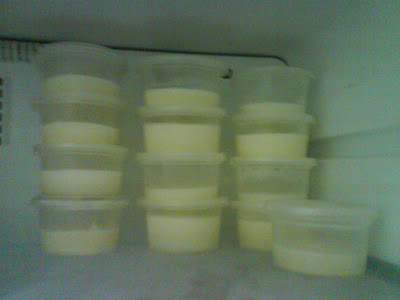
2/6/07
2 hari sebelum naik kerja, aku dapat stok susu banyak ni.. tu pun ada sekali dua train Fahri pakai botol dengan masukkan EBM yang diperah. Ada juga cuba bagi susu formula SNOW, takut susu EBM tak cukup. Still rasa tension lagi sebab Fahri suka sangat bergayut, sampai tiap kali aku pam dapat 1 oz aja..
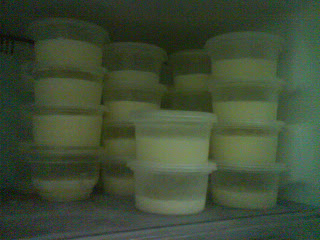
27/7/07
Masa naik kerja bulan 6, mengepam 3 kali sahaj asehari. Lepas tu baru kutahu, cam kak Mieza/Ehem/koci pesan, kena tambahkan sesi mengepam untuk banyakkan susu dan buat stok. Aku dulu sama macam mereka-mereka yang terpaksa top up formula. Perah hari ni, bagi esok. Jadi bermulalah sesi mengepam sekurang-kurangnya 5 kali sehari. Masa ni, struggle gila nak cukupkan stok.. tiap-tiap malam bangun 2 kali nak perah susu. Ada sekali tu, sebab dah selalu sangat perah, aku perah keluar darah.. adoiii
Bila dah tambah sesi mengepam, alhamdulillah dapat at least 20 oz satu hari.. cukup untuk Fahri minum (5 feedings * 4 oz). Masa ni rajin ngepam hujung minggu gak.
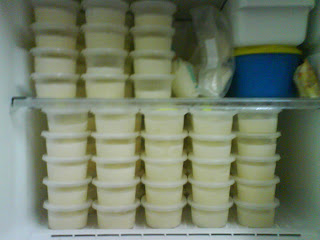
29/11/07
Gambar terbaru.. dek kerana bekas dadih dah sendat isi, kena bertukar kepada playtex liners pulak. Terpaksa berkorban sebab susu tak letak kat rumah mak aku. Memang semua stok dalam fridge sendiri..
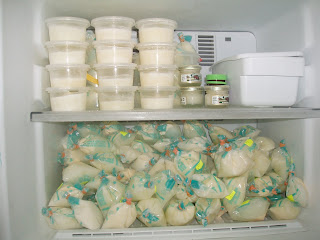
Sekian kronologi dari saya.. next person please...
sambungan kronologiku:
23/01/08
masa ni Fahri dah 9 bulan, so susu masih masuk. prolactin level masih tinggi.

23/03/08
ini pula lepas Fahri hampir setahun (dia lahir pada 3/4/07). memang sudah agak surut, sebab production pun dah menurun. fahri dah banyak makan.
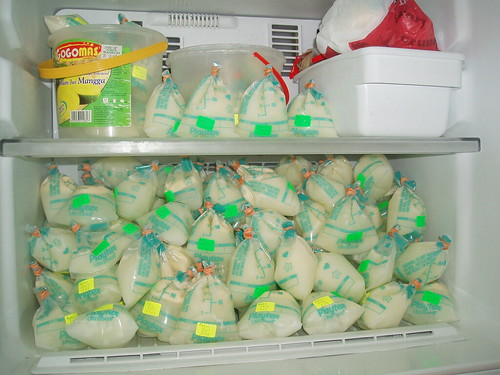
9/5/08
production lepas fahri setahun sebulan.. aku lega sangat sebab masa fahri bawah setahun dulu rajin sangat buat back up stock.. maknanya bila pakai stock stash pun, taklah nampak surut sangat susu dalam freezer.
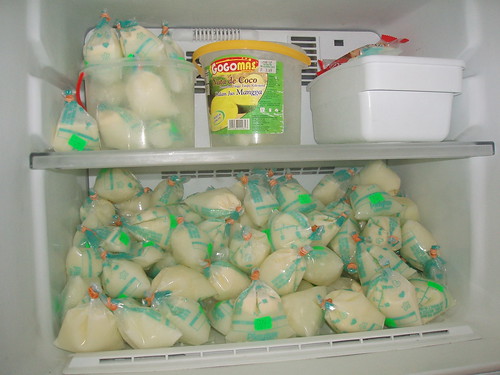
untuk mereka yang anak susuan sudah melebihi setahun.. never ever give up hope on full breastfeeding.. walaupun korang maybe terpaksa campur FM, you have reached the milestone of 1 year old breastfeeding your child! i am still amazed dengan kekuatan azam ibu-ibu susuan sekelian.
buang jauh-jauh penyakit M... bila anak dah makin besar, lagi kuat penyakit M tu akan datang. bila you miss one pumping session, you will notice your production drops. dan nak menaikkan itu bukan mudah (agak berpeluh juga) |
|
|
|
|
|
|
|
|
|
|
|
kronologi kak mieja(mama Ali), sifoo yang menjadi our motivator
Nie Hari ke-4, sessi pengepaman masa dlm pantang:
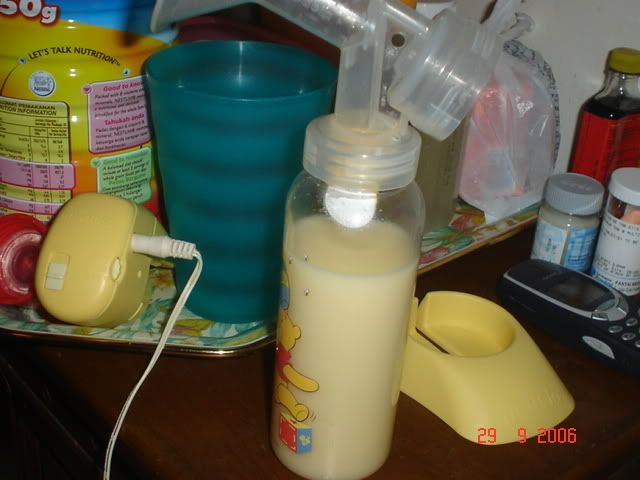
Susu siap dipam, utk ali minum...masa nie kat hospital, ali jaundice:
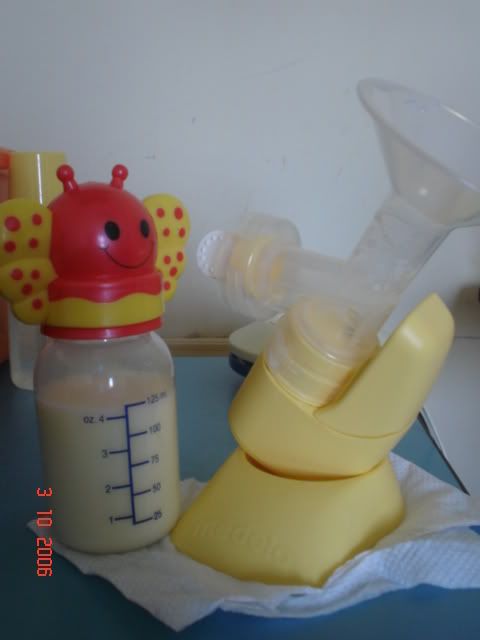
Hari ke-10:
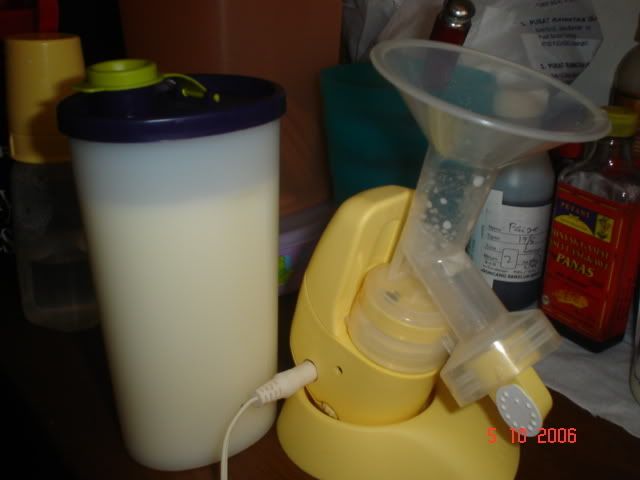
nielah stok akak dlm tatoo yg penuh masa genap-genap 40hari:
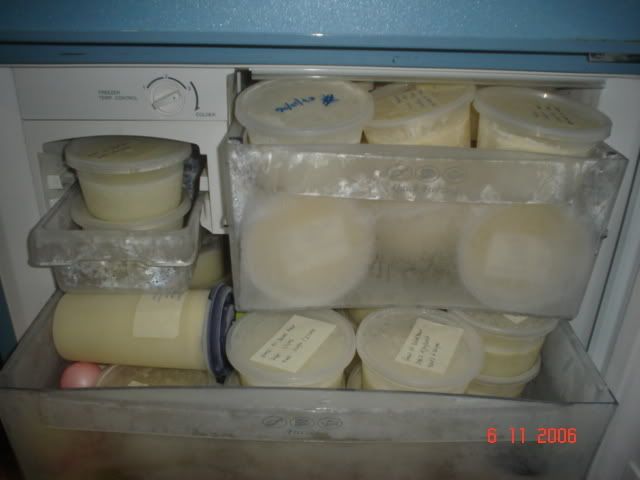
terpaksa simpan jugak kat beku biasa::
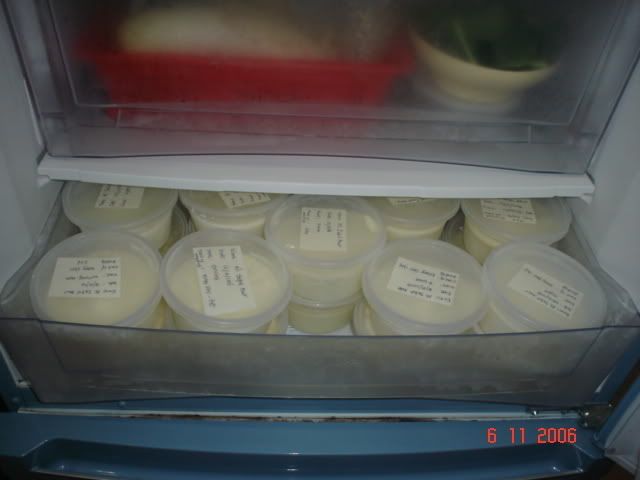
nie lebihan yg tak muat msk beku, simpan kat atas sementara freezer sampai:
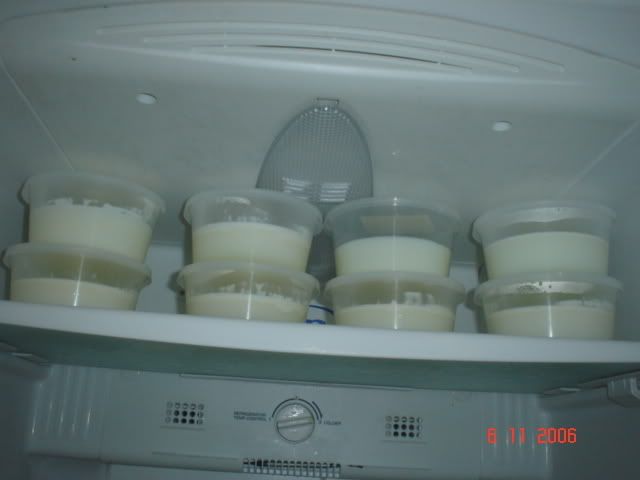
Akhirnya, hubby setuju beli freezer.......sukaaaa sangat sbb dpt freezer baru....
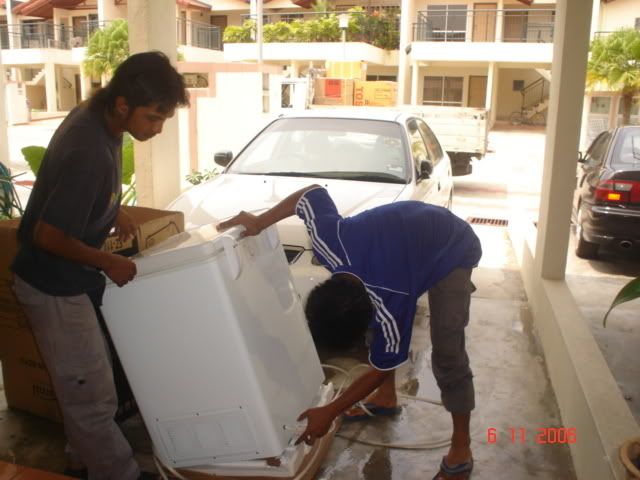
Nielah freezerku mistral:
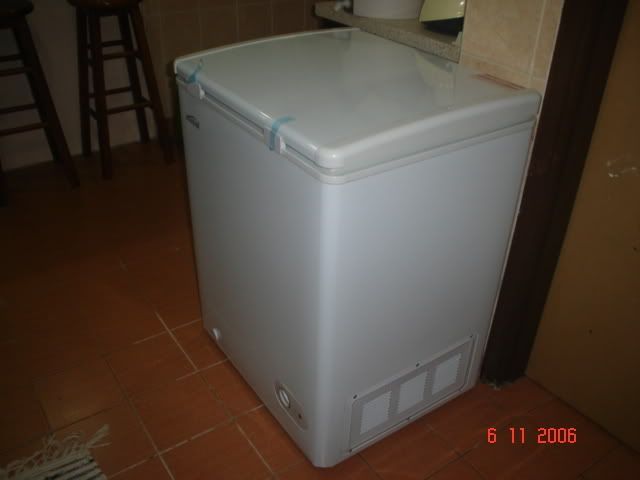
sessi memungah ke freezer baru
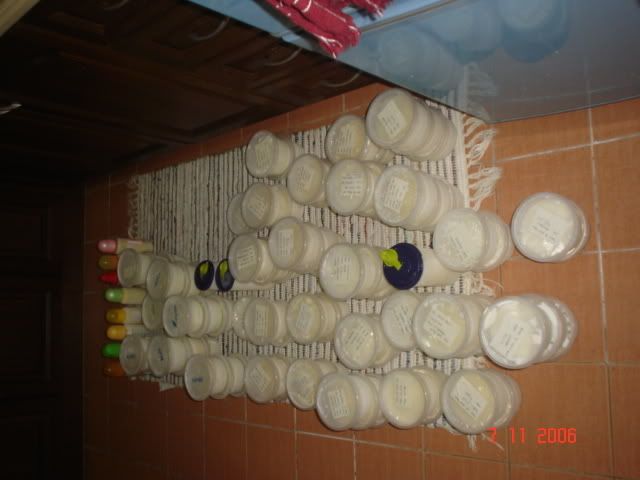
taraaaaaaaaaaaa.....dah penuh sessi mengatur mengemas semula
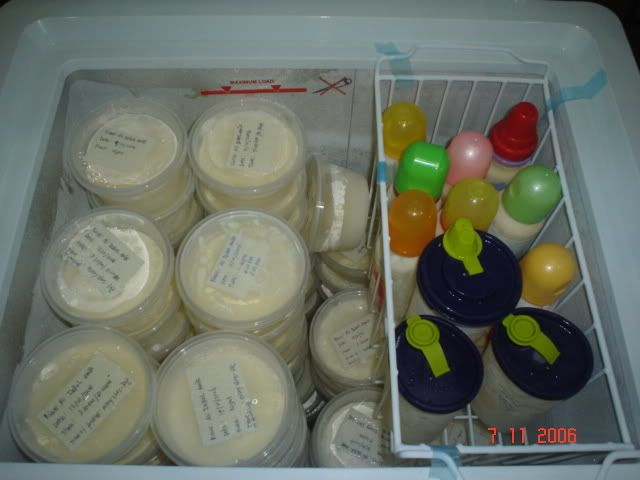
Nie selepas akak 46 hari hari, balik kg hubby...seminggu kat kg, nie hasil pengepaman disana
Siap utk dibawa balik ke KL:
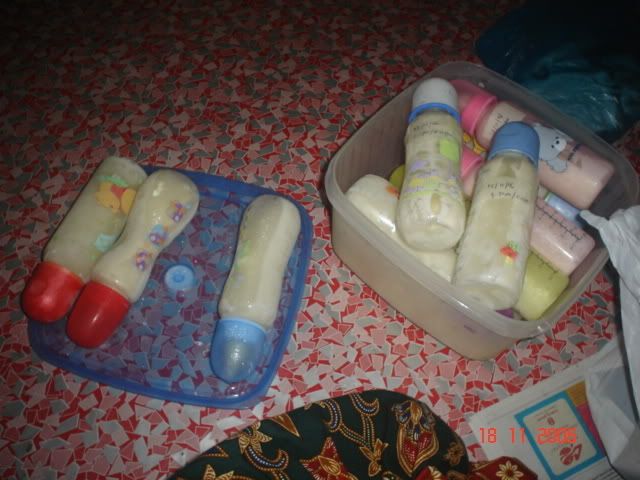
hasil selepas naik keje, satu sessi pengepaman:
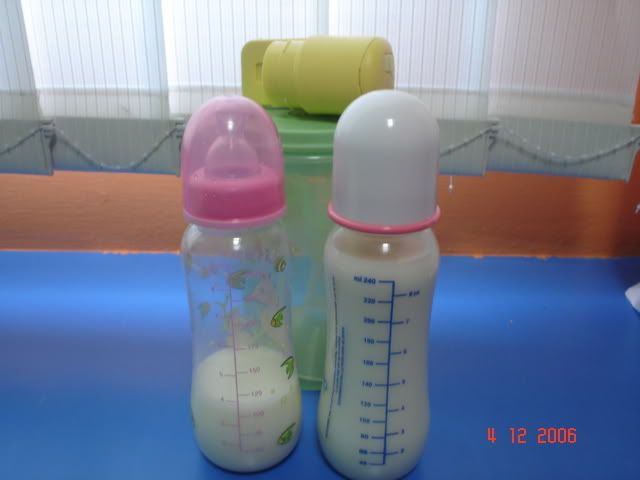
nie jugak hasil satu sessi pengepaman: tinggal kenangan.........skrg tak dpt dah camnie...
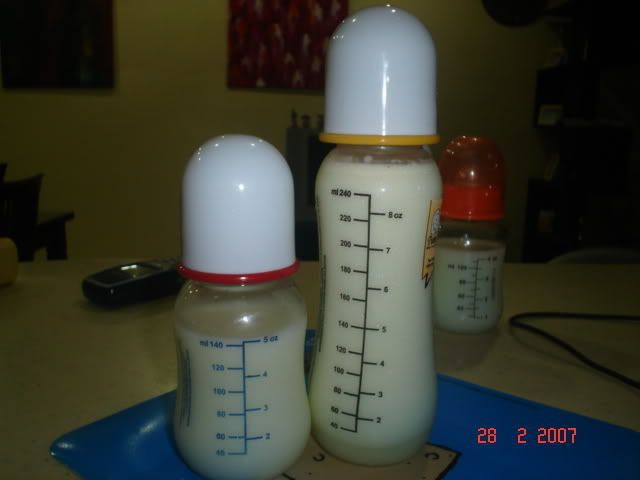
nie hasil selepas naik keja dari pantang, letak kat tanto sbb freezer still penuh lg masa tu:
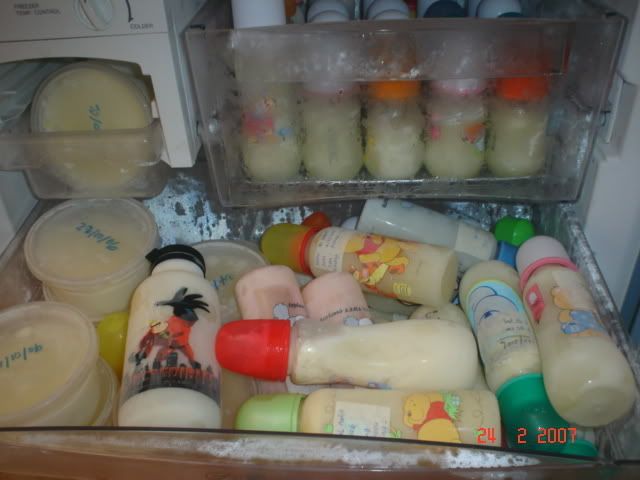
nie July 2007, stok sblm puasa
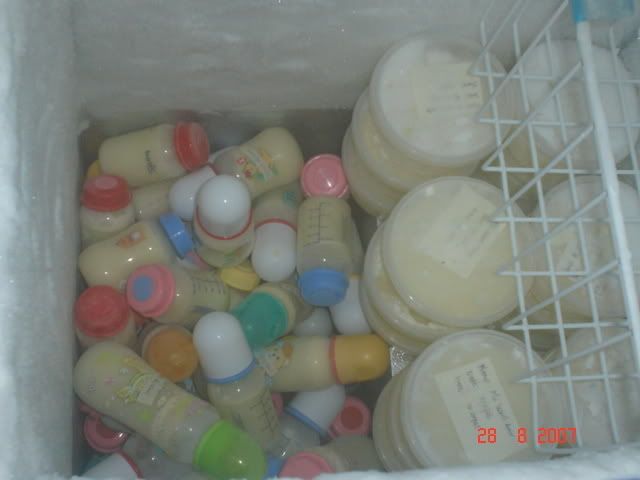
nie august 2007
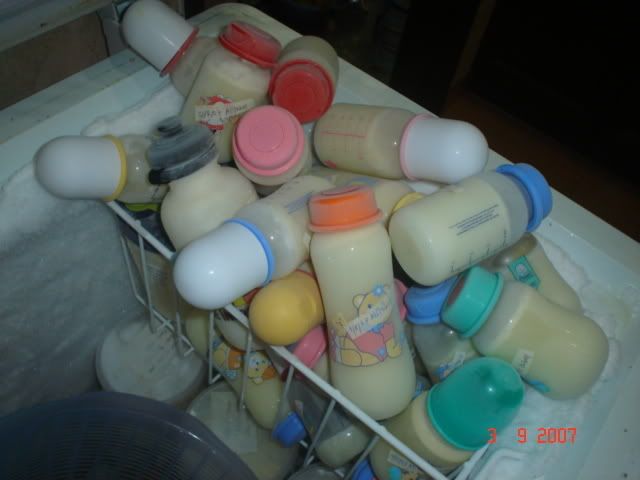
nie sempat snap 2kali jerk...tk terpikir plak nk snap sblm nak bagi.....nie jerk kenangan yg ada...
utk anak susuanku:
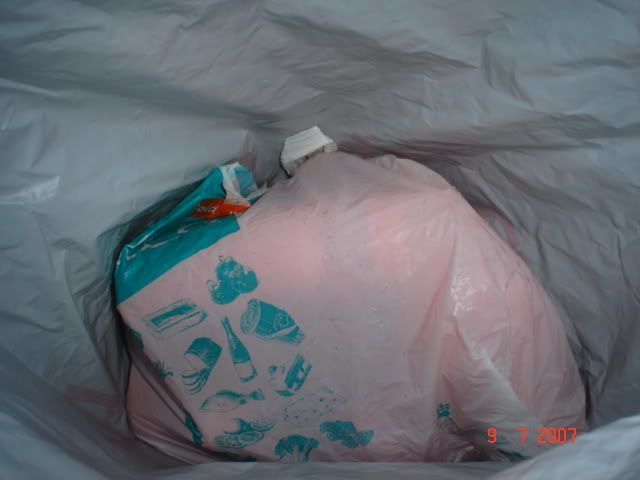
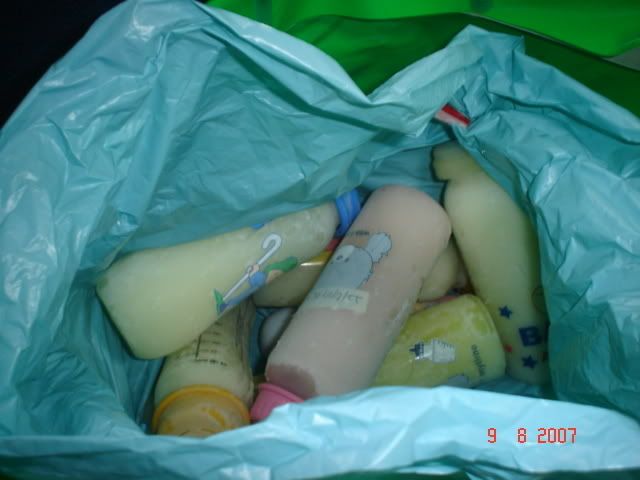
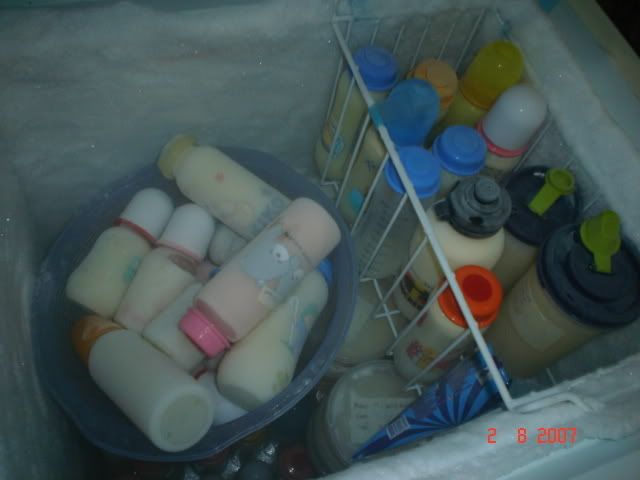 |
|
|
|
|
|
|
|
|
|
|
|
a very good article from dr Azwan blog (hope he dont mind am sharing its here) http://drazwan.blogspot.com/
Assalamualaikum Wbt.
Sempena Hari Ibu ini saya ingin mengambil kesempatan untuk mengucapkan Selamat Hari Ibu kepada semua ibu-ibu di dunia ini |
Rate
-
1
View Rating Log
-
|
|
|
|
|
|
|
|
|
|
|
memberi semangatt pd sya..
w/p skrg ni hasil ebm agak merundumm..  |
|
|
|
|
|
|
|
|
|
|
|
Ree, quote sekali url blog dia ya
Originally posted by mrs_ree at 23-12-2008 04:19 PM 
a very good article from dr Azwan blog (hope he dont mind am sharing its here)
Assalamualaikum Wbt.
Sempena Hari Ibu ini saya ingin mengambil kesempatan untuk mengucapkan Selamat Hari Ibu kep ...
** posting nih akan diganti dgn info..Thanks
[ Last edited by ajasu at 15-3-2009 11:33 ] |
|
|
|
|
|
|
|
|
|
| |
|